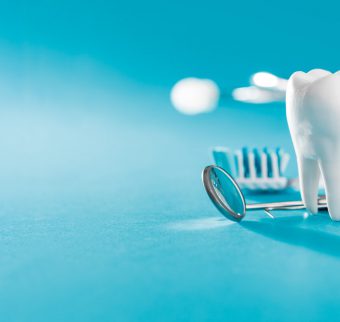There’s no “Just a…” in Dentistry
Every visit to the dentist – no matter how minor – is important to the patient, who should fully understand their treatments
[ words: Alun K Rees ]
It’s funny how the simplest of phrases can be misunderstood. When we say to a patient “just a” we mean “simply” or “there is nothing more than this” or “you can be reassured”. However, when used in conjunction with, for instance, “check up”, “a clean” or “the hygienist” it can diminish those processes or people.
Why is that? For most of us, dentistry is the day to day, the norm, it’s what we do week in, week out. But for our patients it’s no such thing; a visit is quite rightly a big deal. They know that they are going to be lying prone in a dental chair, a bright light shining close to their eyes and that someone will be using sharp metal instruments. The mouth is the opening to the lungs and the gut and wants to protect those canals. The oral cavity has a highly developed nerve supply and is very aware. Like it or not, dentistry can be an intimidating experience.
Throw into the mix the recall of any bad experiences that – for all our relaxation techniques, our empathy and reassurance –lingers at the back, or half way to the front, of the mind.
This visit, this time, has been in their diary for several weeks or more. They have organised their day around it. For them it is a big deal. There should be no “just a” about it.
Nobody wakes up in the morning and shouts, “Yes! Dentist today! I can’t wait! I do hope they have to prove how skilled they are. I really want them to earn their money. I hope it takes ages so I get good value!”
Hands up who wants to be a difficult or challenging patient? Whether it be biopsy or vaccination, endodontics or endoscope we all want it to be straightforward when it’s us on the receiving end. Of course we do.
But life isn’t always that straightforward. Some procedures are downright unpleasant. Nobody would volunteer for a molar root treatment or a surgical procedure if the alternatives were a good lunch or a trip to the beach.
“Just a” is meant to reassure, to comfort, to help, I understand that. However saying “just a check up”, “just a cleaning” or “just the hygienist” can make these visits less important in the patient’s mind, and yet we all know how important they are and how we want them to be valued by the patient.
When I ran my practice, in the dim and distant past, my team and I sat down and decided on a vocabulary of words and phrases that we would and wouldn’t use. New patient examinations and check-ups became Dental Health Assessments and Reviews respectively.
With our focus on health and particularly gum health we explained and showed the problems and the diagnosis, then ran through the causes and solutions and explained why it was important that the patient took responsibility for looking after themselves at home before any active treatment was started.
When possible we let the patient meet the hygienist before they left the practice. That way, when their appointments were made, they had already met the person who would be working with them. The routine gum health review emphasised the importance of periodontal disease and its control.
A team member at “front of house” who had no previous dental knowledge gave us a welcome opportunity for us to “translate” what was involved in various treatments to her; this then allowed her to explain in straightforward terms to patients.
In these days of not only obtaining informed consent but also ensuring the patient does fully understand procedures, it is vital that they are able to repeat in their own words what is planned for them and why. Taking the time to work on the clear “what, why, how, when and who” can save a lot of misunderstandings and problems.
It also means that the patient is able to take ownership of their diseases and their control, can make informed decisions about the timing of future treatments and is able to anticipate what needs to happen.
None of this comes without hard work, particularly teamwork. Regular team meetings mean that everyone can get on board. Practicing what we say is needed but, in my experience, this is something that seldom seems to be done in-house.
Rehearsing conversations can become a sort of game where different team members choose a card with a procedure and then have to explain it to another team member who does their best to misunderstand and then ask difficult questions.
The more you practice, the more you realise how hard it is to be a dental patient and how hard it can be to fully comprehend what is planned for you.
Give it a try.
About the Author
Alun K Rees BDS is The Dental Business Coach. An experienced dental practice owner who changed career, he now works as a coach, consultant, trouble-shooter, analyst, speaker, writer and broadcaster. He brings the wisdom gained from his and others’ successes to help his clients achieve the rewards their work and dedication deserve.
www.thedentalbusinesscoach.com
Tags: Alun K Rees, management
